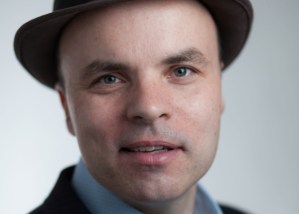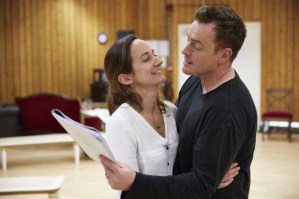Review: Oslo (National Theatre)
JT Rogers’ Tony Award-winning play arrives at the National Theatre starring Lydia Leonard and Toby Stephens
By 1992, official negotiations between the Israeli government and Yasser Arafat’s Palestine Liberation Organisation (PLO) had all but come to a standstill under American stewardship in Madrid. Across Europe, two Norwegian diplomats, Terje Rød-Larsen and Mona Juul, a married couple, engineered the start of a secret back channel between the two sides. Within a year, the Oslo Accords had brought peace to pass.
But not without a year of delicate negotiations – fruitful, but consistently fraught – and, in Oslo, which lands in London with a Tony in tow, the American political playwright JT Rogers plays that peace process out. He does so with a real eye for the human side of history and, like Peter Morgan’s Frost/Nixon, Oslo has it hinge on a tense head-to-head.
It’s a proper political thriller. The stakes couldn’t be higher – the prize being a peace few thought possible. The catch-22s stack up early on. Not only are their positions irreconcilable – both sides claim Jerusalem as their rightful capital, for starters – but Israeli officials can’t, by law, meet PLO members, who, in turn, won’t meet anyone less.
Rød-Larsen’s solution is to bring two jovial academics to Oslo, persuading PLO Finance Minister Ahmed Qurei (Peter Polycarpou) and his hardline liaison officer Hassan Asfour (Nabil Elouahabi) to take their authority on trust. It’s the first time either man has met a Jew, but their wariness melts over whisky and waffles. Hospitality oils the cogs, and humour breaks the ice. Most of the time.
Even if we know the end result, Rogers keeps the tension dead taut throughout. He succeeds by showing both how precarious the process is – one false move and it falls, one bad joke blows it – but also how many moving parts are in play. For two nations to agree, dozens of individuals – each with resentments, tempers and egos – must do so too. They include Philip Arditti‘s hotheaded, hip-swinging Israeli minister and his boss, Jacob Krichefski’s humourless legal fiend.
Against that Rogers can be a bit schematic. As a Rubix Cube, pieces falling into place, the play’s satisfying, but it's structured like a computer game – the PLO progressing through a series of Israeli bosses. You’re always aware of Rogers pulling the process' strings, putting it in danger, then pulling it back from the brink, and Bartlett Sher’s straightforward staging can be see-through.
It’s down to Rød-Larsen and Juul to keep the plates spinning, and they do so with a mix of quick-thinking and smooth-talking. Lydia Leonard is level-headed and humble, brushing off effusive toasts as part of the job. Toby Stephens as Rød-Larsen is more of a conundrum – charming but smarmy; smooth yet oleaginous. The enduring image is of him holding two phones – at once go-between and buffer zone – but he’s a wallflower who can’t help pulling focus. His desire to take credit almost scuppers the project, yet there’s something too English, too easily establishment, about this radical Norwegian. Polycarpou, meanwhile, gets his PLO man bang on: he’s warm when he can be, with a belly laugh and a sweet tooth, but hardens when he has to in order to hold his own.
That simple, shared humanity is at Oslo‘s heart. In that, it’s absolutely a play for today. Peel back its surface skin and it’s about two apparently irreconcilable oppositions. Its faith in face-to-face encounters – hospitality and humour, the spaces humans naturally find common ground – stacks up against endless, impersonal online spats. Coincidence, but 1993 was also the year the web went public.
If peace needs presence, so too does theatre. Rogers delicately entwines the two, proving the peace process as a theatrical act. With two sides in a stand-off, neither able to give ground without ground being given, any negotiation needs an imaginative leap to get started. It needs both sides to drop their mutual suspicion or, put another way, to suspend disbelief.
Even those present are acting, standing in for their superiors, even for their entire nations. Rogers makes that real right at the end as, in a moment of high-spirits, Arditti’s impersonation of Arafat shakes hands with Rød-Larsen’s Shimon Peres. The whole thing, you realise, is a big hypothetical – one big 'what if'. A peace process, like theatre, imagines a possible future.
Oslo runs at the National Theatre until 23 September and then runs at the Harold Pinter Theatre from 2 October to 30 December.
















